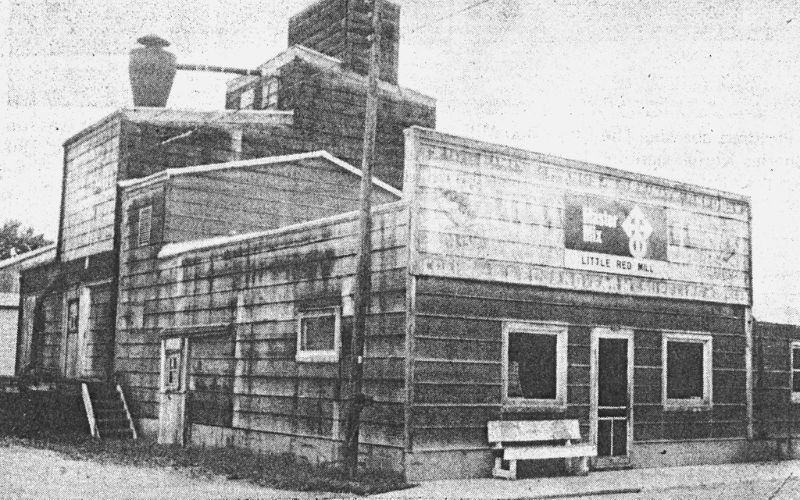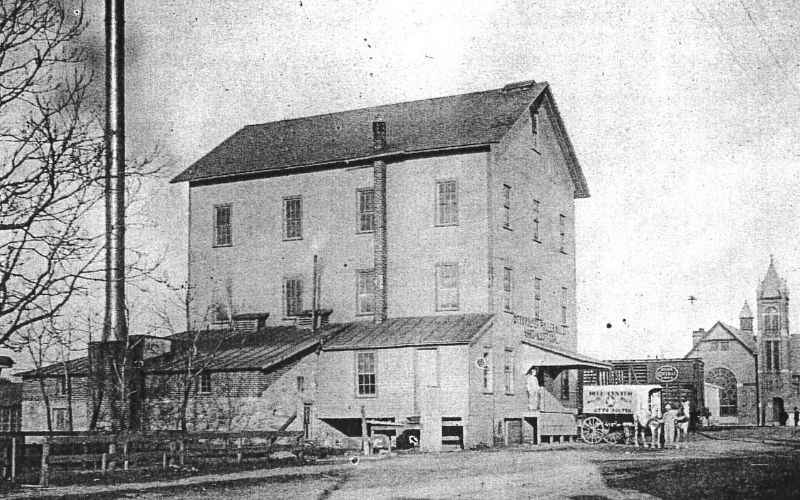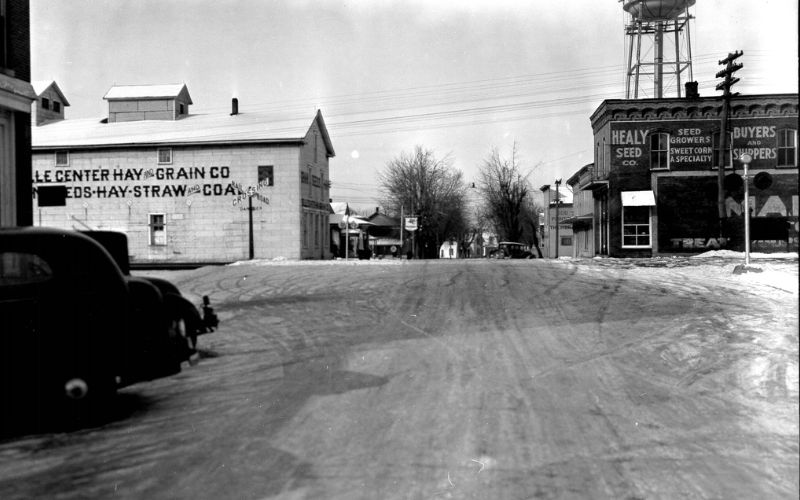By: Mary E. Mortimer
Agricultural businesses in Belle Center were an important part of the Belle Center community for many years. Early agricultural businesses included the Little Red Mill, Belle Center Milling Co., Healy Seed Co., and the Belle Center Hay and Grain Co.
The Little Red Mill was built by Andy Dodds in 1889 and operated by his nephew, Owen Dodds. The mill provided custom grinding of grains and flour milling. They also sold poultry feed and coal. The “little” part of the name came from local residents because it was a small mill with a 3-inch-wide conveyor belt, and small buckets, and the office was tiny. The “red” part of the name came from the building always being painted a bright crimson red.
After a few years, Dodds sold the mill to John Ruble and Heston Jacobs. A short time later Jacobs sold his interest in the mill to Ruble. Around 1913, Ruble sold The Little Red Mill to C.E. Kerns who owned and operated it for 25 years. During those years, Kerns’ son, Sidney, managed the business. In November 1929, they installed new scales with a two-ton capacity and built a new office.
In 1944, the Kerns family sold the mill to Ralph “Tub” and Mildred Smith. The Little Red Mill underwent a major renovation in 1949. At that time, the rear section of the mill was removed to make room for a new storage area. The original mill area was replaced with a new building. Smiths sold the Little Red Mill to Roger and Betty Timmons in August 1982. They carried the same supplies as Smith which included garden and farm seed, bird seed, and pet supplies and they added handmade gifts, and a few grocery items. The Little Red Mill is still in business today as a convenience store.
The Belle Center Milling Co. was built by William C. “Uncle Billy” Dodds in the 1890’s. The mill was managed by Otto Polter, who later purchased it. The mill then became known as the Otto Polter Roller Mill. They were known for their “Moss Rose” flour which was considered “the best flour that could be found anyplace”. The 50 lb. bags of flour featured a large picture of a rose with the name Moss Rose. Flour deliveries were made by Ob Price with a covered wagon and a team of horses. In those days, almost everyone baked their own bread, and they depended on the flour deliveries. In the early 1920s, the milling business declined, and the building was sold to the Belle Center Grain Co.
The Healy Seed Company was established by brothers Patrick and Edward Healy in 1906. They were wholesale growers of seed corn and bought and shipped small grains and grass seeds. They had a 250-acre farm where they grew seven varieties of sweet corn and reportedly could ship up to 20,000 bushels of field seed corn in a single season. Popcorn seed was grown as field corn seed. They distributed timothy and clover seeds from local sources and alfalfa seeds from Montana. The Healy’s sold a large variety of garden seeds they purchased from the eastern growers and from Europe. They had two large warehouses for their seed potato business.
In December 1920, the third floor of their warehouse gave way with the weight of thousands of bushels of oats, wheat, and barley. They had 25,000 bushels of oats alone stored on the third floor. Patrick Healy passed away in 1935 and Edward continued to operate the business until about 1938. The Healy brothers’ building then became part of the Belle Center Grain Co.
David Christian Keller started in the elevator business in Bellefontaine in 1886 as the Armstrong, Keller & Co. They were located on W. Columbus Ave. and were dealers of grain, seeds, wool, and coal. The name was changed to Keller & Dowell in 1899.
In the early 1900’s Keller established the Belle Center Hay and Grain Co. At that time, hay was a large part of their business. He sold large quantities of hay to southern mines for their mules. Along with grain being bought, sold, and shipped, they also had a large coal business. Most homes were heated with coal rather than wood. As many as two train cars per week carrying 25 tons of coal were shipped in. When the railroad switched to larger cars, they could ship 50 to 60 tons of coal per car. The business was incorporated as the Belle Center Grain Co.
Chester Keller joined his father in the business and expanded their facility to include the former Otto Polter Mill and the Healy Seed Co. Errett Baier became a partner in February 1939 and managed the elevator until he passed away in 1957. David C. Keller joined his father, Chester, in the family business in 1945 after he returned from serving in WWII. After Chester Keller passed away in 1959, David Keller took over management of the Belle Center Grain Co.
The elevator served the Belle Center area farmers with grain storage, shipping, and grinding. They also sold feed, seed, fertilizer, and farm supplies. Grain was bought and shipped via the railroad until 1970 when the track was disbanded between Belle Center and Kenton. Later the spur line between Belle Center and Bellefontaine discontinued. The Belle Center Grain Co. trucked grain to centers in Lima, Toledo, Marion, Fostoria, and Dayton. One year they reported they had handled over 500,000 bushels of grain. They had a storage capacity of about 130,000 bushels. David C. Keller owned and operated the Belle Center Grain Co. until he closed it in 1990 and retired.
Visit the Logan County History Center to learn more interesting aspects of Logan County history.
The History Center is open for tours Wednesday – Sunday from 1:00 pm to 4:00 pm.







